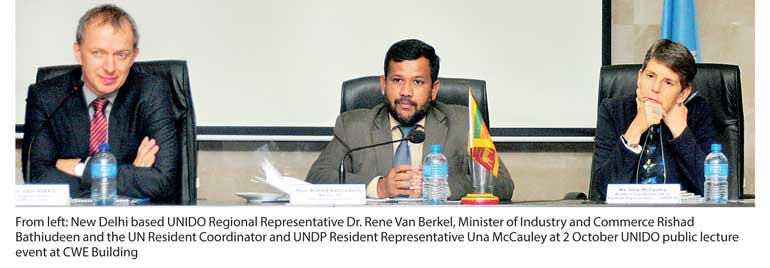Sunday Feb 22, 2026
Sunday Feb 22, 2026
Wednesday, 4 October 2017 00:00 - - {{hitsCtrl.values.hits}}

Having inked the Sustainable Development Framework with Sri Lanka in August, United Nations Sri Lanka has unveiled its way forward on the country’s sustainable industry goals for the first time on 2 October in Colombo.
“SDGs are the global goals for our own survival,” voiced UN Resident Coordinator and UNDP Resident Representative Una McCauley on 2 October at CWE Building, Colombo. Resident Coordinator McCauley was speaking at the public lecture event by New Delhi based UNIDO Regional Representative Dr. Rene Van Berkel titled ‘Inclusive & Sustainable Industrialisation for Sri Lanka’. Joining the event were Minister of Industry and Commerce Rishad Bathiudeen, Minister Bathiudeen’s Senior Advisor Himali Jinadasa, Head of UNIDO Focal point in Sri Lanka Nawaz Rajabdeen, and representatives from various Chambers and industries in Sri Lanka.
The 2 October event in Colombo by UNIDO Focal Point in Sri Lanka was to highlight the industry related SDGs called as SDG 9 (framework) and their way forward map for Sri Lanka.
“SDGs are the global goals for our own survival. We have only one planet,” said McCauley, and added: “Lankans are extremely mindful of environment. SDG indicators are not just quantitative but qualitative as well. You can contribute to SDGs through everything you do. The 14 UN agencies resident in Sri Lanka are enlisted for this. The Sri Lankan SDG targets are driven by four drivers – firstly improved data and knowledge management, secondly strengthened public institutions towards lasting peace, thirdly socio economic resilience, and finally resilience to climate change and disasters.”
“We are introducing the international industry best practices to Sri Lanka with SDG 9 Framework. There is a five trillion dollar opportunity waiting for Asia in SDGs,” declared Dr. Berkel, and added: “UNIDO’s current portfolio in Sri Lanka has three projects valued at $ 10 million – strengthening the trade competitiveness of SMEs, bamboo processing and environment management on PCB waste. Cinnamon value chain mapping, and Minimata initial assessment are among the completed projects here. We also pioneered world’s first chemical leasing with National Cleaner Production Centre in 2015 in Sri Lanka. The total economic potential could be two-to-three times than the five trillion dollar opportunity waiting for Asia in SDGs! Sustained industrialisation is possible subject to structural transformation. Labour cost competition, productivity increases and changing market demands (including quality of goods) can over time be countered by technological learning so that industrial development can break into higher value adding sectors and diversify to meet growing national demands Industrialisation is the engine of economic growth.”
In partnership with Watercare Technologies Ltd., UNIDO and the National Cleaner Production Centre (NCPC) of Sri Lanka, MAS Active Linea Intimo launched the world’s first chemical leasing project for waste water treatment in Sri Lanka in July 2015.
Minister of Industry and Commerce Rishad Bathiudeen thanked UN Sri Lanka and UNIDO for the continued support given to the country’s industrialisation efforts. “The industry sector share in our GDP is almost 30% and therefore is important for us. Even industry contribution to GDP in such developed countries as Japan, Spain and Austria are at same levels as Sri Lanka at 29-30%,” said Minister Bathiudeen, and added: “The industry share of employment is around 18%. Last year the manufacturing value addition rate in Sri Lanka was 15.4%. We are aiming to become an upper middle income economy and the importance of industries such as export led industries is increasing. It is here sustainable industry development becomes crucial. SDG 9.2 promotes inclusive and sustainable industrialisation. UNIDO has been supporting Sri Lankan industry development in many ways. Therefore we welcome UNIDO starting work on SDG 9 for us in their new strategic plan.”
In September 2015 President Maithripala Sirisena attended the United Nations Summit where the Sustainable Development Agenda 2030 (SDG 2030) was adopted. The leaders agreed to implement SDG 2030 at national level in their countries starting 1 January 2016. On 3 August, the Government of Sri Lanka and the United Nations signed the 2018-2022 UN Sustainable Development Framework (UNSDF) – “the overarching framework for the work of the United Nations in Sri Lanka in line with the national priorities of the Maithri Palanayak, Sthaavara Ratak.”
Under UNSDF, the UN is to invest $ 300 million for the development of Sri Lanka – over the next five years.